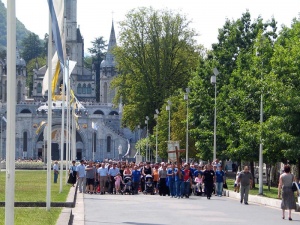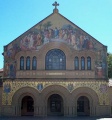Church
|
The church is not a building. Nor is it an organisation or human institution. The church is simply the people whose sins have been forgiven through their faith Jesus Christ... (An extract from the book Once a Catholic by Tony Coffey)
|
Church / Ecclesiology
 Christians at Lourdes. | |
| RELATED TOPICS |
|
| SERMONS, ESSAYS AND OPINIONS | |
| CONTENTS | |
The word church is used in many different ways. The church is the Christian community of believers, that is, it is the people. Sometimes the word church is also used to refer to a church building (the building used in Christian worship) or a church service (the weekly meeting of a group of Christians in a church building) or to a church denomination.
Ecclesiology means the study of the doctrine of the church.
Etymology
The Greek word ekklesia (Εκκλησια) is translated as "church" in English.
This word ekklesia was used in ancient Greek to mean "gathering" or "assembly" in a political sense. In the ancient Greek translation of the Old Testament, the LXX, the word ekklesia occurs over 200 times (usually as a translation from the Hebrew word qahal), most commonly to refer to the assembly of the covenant people of God. In the New Testament the word ekklesia occurs in the gospels only twice (Matthew 16:16 and Matthew 18:20), but it occurs many times elsewhere in the New Testament.
From the Greek root ekklesia, the English word Ecclesiology is derived, which is the study of the doctrine of the church.
The English word "church" itself is actually derived from the Old English word "cirice" (which is related to the Greek word "κυριακή" which means "of the Lord")
Uses of the word "church" in common English
TIn English, the word "church" means different things to different people in different contexts. It can be used in reference to a gathering of people for a religious meeting. It is also sometimes used to refer to a building or group of buildings, and occasionally it refers to an entire denomination. It can also be used in an institutional sense to refer to all churches, such as "... the church today...."
Nature of the Church
There are a variety of understandings about what the church actually is.
The context in which the word ekklesia (church) is used in the Bible suggests that it was not originally intended to mean a building or an organization, but instead was intended to primarily mean a congregation or meeting of God's people. Thus the church, although consisting of the community of believers, is not simply the community of believers, but also includes activity.
Furthermore, although consisting of people, the church is not simply an instution created by people. In Matthew 16:18 Jesus spoke about building his church and later, in Matthew 18:20 he spoke about being present among the church
- I also tell you that you are Peter, and on this rock I will build my assembly, and the gates of Hades will not prevail against it. (Matthew 16:18)
- For where two or three are gathered together in my name, there I am in the midst of them." (Matthew 18:20)
The Bible uses the term church in both a local and universal nature. Mostly the word refers to local churches, for example, the church in Rome or Antioch. Quite often it is spoken about the plural. On a few occasions the New Testament uses the word in a general or universal sense.
Throughout church history, starting with Augustine, the church has sometimes been spoken about in terms of the "invisible church" as opposed to the "visible church". The invisible church basically means the community or collection of true believers in Jesus regardless of denominational affiliation. The term visible church is used to refer to the physical countable members or leaders that make up a church or group of churches. Many Protestant churches tend to emphasize the invisible church, and view this as something quite distinct from the visible church. The Roman Catholic Church, on the other hand, teaches that the invisible church and visible church are very closely connected, although there is recognition that some elements of the invisible church can be present outside the visible Roman Catholic church.[1]
Mission of the church
The church's mission can be summarized as to bring glory to God through humanity mirroring God’s own holy character of love[2]. This involves:
- Honourable worship to God
- Building up of each other within the church
- Reaching out into the world through service and evangelism
Church building
Christians worhsip in church buildings. Although the Church (the people that belong to Jesus) can meet anywhere, they have since early times built buildings specifically for worshipping God in. There are many well known church buildings around the world such as St. Peter's Basilica in Rome. A common architecture for churches is a building in the shape of a cross, often with a dome or other large vaulted space in the interior to represent or draw attention to the heavens.
Photos of church buildings
The main church in Echmiadzin, the physical centre of the Armenian Orthodox Church
The door of the famous church in Wittenburg where Martin Luther is thought to have nailed his 95 Theses to the door
The church in Olney where John Newton, author of the hymn Amazing Grace worked
Stanford Memorial Church in California
A small local church, Trinity Baptist Church in Adelaide, Australia, once known as the "City of Churches"
Church history
Since the church was formed after the resurrection of Jesus, major events and conflict, often over matters of doctrine have resulted in significant rifts. Initially the early Christians spread the good news of Jesus throughout the Roman empire and small congregations of Christians sprang up in many towns. Rome soon became the geographical centre of the church. However, there was a rift between the Church in Greece and the one in Rome that slowly developed over centuries culminating in a schism in 1054 AD. Later, in sixteenth century, Christians in northern Europe split from the Roman church, an event known as the Reformation. Today there seems to be a bewildering array of denominations. Some of the larger ones include Roman Catholicism, the Greek and Russian Orthodox churches and the wide variety of Protestant churches.
Quotes
Once a Catholic by Tony Coffey
- The church is not a building. Nor is it an organisation or human institution. The church is simply the people whose sins have been forgiven through their faith Jesus Christ.
Lenny Bruce
- Every day people are straying away from the church and going back to God.
Charles de Lint
- Why did men worship in churches, locking themselves away in the dark, when the world lay beyond its doors in all its real glory?
Robert Short
- The church is the great lost and found department.
Ralph Waldo Emerson
- I like the silence of a church, before the service begins better than any preaching.
George Mueller
- An unvisited church will sooner or later become an unhealthy church.
Ignatius of Antioch
- Where the bishop, there the church (Ubi episcopus, ibi ecclesia.)
Eugene de Mazenod
- To love Jesus Christ means to love the church
References
- ↑ Congregation for the Doctrine of the Faith: Responses to Some Questions Regarding Certain Aspects of the Doctrine of the Church, 2007, second and third question.
- ↑ Stanley J. Grenz, Theology for the Community of God (Grand Rapids: Eerdmans Publishing, 2000), 489.
Links
Return to Christianity
Note to users: The wiki is currently operating in safe mode. Editing is limited to users with certain privileges in order to deal with spam. You can create a new user account, and confirm your email ID in order to obtain ability to edit pages. Learn how to be an editor or sysop at WikiChristian.
- Sister projects: WikiMD.com Wellness Encyclopedia & Directory
- Sponsors: WikiChristian is supported by W8MD's medical weight loss and sleep centers.






